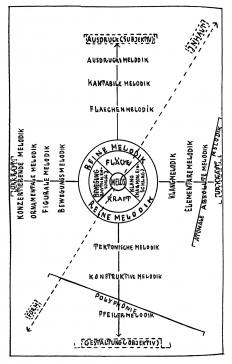For many observers of music-theoretical thinking in Europe around 1910, the state of the art was identified with research programs oriented by the ascendancy of academic psychology. It had widely become intuitive to assume that statements about musical experience had to be grounded in forms of knowledge derived from psychological research and its cognates (psychophysiology, psychoacoustics, psychotechnics, etc.). Yet to the extent that the naturalistic research program produced results that often appeared reductive in relation to standing beliefs about the complexity of musical life, it would seem to have been set up to disappoint.
My research explores how this sense of disappointment stimulated a contrarian or skeptical stance toward the naturalistic agenda in music aesthetics. Particularly in the Weimar era, a series of attempts to formulate an antipsychologistic discourse around music emerged among a disparate assortment of philosophers, critics, musicians, and pedagogues, such as Paul Bekker, Heinrich Besseler, Arthur Wolfgang Cohn, Heinz Edelstein, Herbert Eimert, Gustav Güldenstein, Hans Mersmann, José Ortega y Gasset, Helmuth Plessner, and Günther Stern-Anders. This discourse may be loosely associated with compositional tendencies such as Neoclassicism or New Objectivity. Yet beyond matters of aesthetic production, the nascent effort was invested in the challenge of formulating an antinaturalistic attitude more generally, one that would funnel the aims of speculative musical thought outward from mere description of experience toward the more ambitious goal of reorienting oneself toward the world at large. The book I am writing attempts to reconstruct and evaluate this theoretical program as well to imagine the implications of taking up an “unnatural attitude” in musical contexts.

